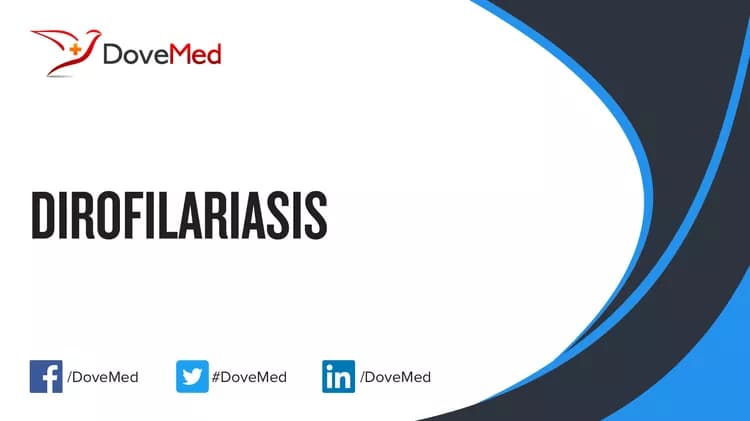What are the other Names for this Condition? (Also known as/Synonyms)
- Dirofilaria Infection
- Pulmonary Dirofilariasis
- Subcutaneous Dirofilariasis
What is Dirofilariasis? (Definition/Background Information)
- Dirofilariasis refers to infections caused by Dirofilaria roundworms
- Although the natural hosts of these roundworms are dogs, wild canids (such as wolves and foxes) and raccoons, humans can be infected with Dirofilaria larvae through mosquito bites
- Signs and symptoms of Dirofilariasis generally include nodules under the skin or lung granulomas (small nodules formed by an inflammatory reaction) which may be asymptomatic
- Some people with Dirofilariasis of the lungs may also experience cough, chest pain, fever, wheezing, chills, and pleural effusion (excess fluid between the tissues that line the lungs and the chest cavity)
- Dirofilariasis is treated with surgical removal of lung granulomas and skin nodules
(Source: Dirofilariasis; Genetic and Rare Disease Information Center (GARD) of National Center for Advancing Translational Science (NCATS), USA.)
Who gets Dirofilariasis? (Age and Sex Distribution)
- Dirofilariasis is a rare infectious disorder. The presentation of symptoms may occur at any age
- Both males and females may be affected
- Worldwide, individuals of all racial and ethnic groups may be affected
What are the Risk Factors for Dirofilariasis? (Predisposing Factors)
The risk factors for Dirofilariasis may include:
- Living in an area which is mosquito infested
- Mosquito bites
It is important to note that having a risk factor does not mean that one will get the condition. A risk factor increases one’s chances of getting a condition compared to an individual without the risk factors. Some risk factors are more important than others.
Also, not having a risk factor does not mean that an individual will not get the condition. It is always important to discuss the effect of risk factors with your healthcare provider.
What are the Causes of Dirofilariasis? (Etiology)
- Dirofilariasis is caused by roundworms belonging to Dirofilaria spp. However, humans are accidental hosts for this worm, which gains entry through bites of infected mosquitoes
- The infected mosquitoes introduce larvae into humans through their bites
- The larvae gain entry through the skin and mature into adult roundworms
However, the adult roundworms are sexually immature in humans, and therefore, human-human transmission of Dirofilariasis does not occur.
What are the Signs and Symptoms of Dirofilariasis?
The signs and symptoms of Dirofilariasis may vary among infected individuals. While some of those infected may remain asymptomatic, others may exhibit the following signs and symptoms:
- Nodules under skin
- Nodules (called granulomas) in lungs
- Cough, which may contain blood
- Chest pain
- Fever
- Pleural effusion
How is Dirofilariasis Diagnosed?
Dirofilariasis is diagnosed on the basis of the following information:
- Complete physical examination
- Thorough medical history evaluation
- Assessment of signs and symptoms
- Laboratory tests
- Imaging studies: The granulomas that arise as a result of Dirofilariasis often have an appearance of “coin lesions” on a chest X-ray
- Biopsy studies, if necessary
- Tests to rule-out other conditions causing the coin lesions on a chest X-ray, including certain types of cancer
Many clinical conditions may have similar signs and symptoms. Your healthcare provider may perform additional tests to rule out other clinical conditions to arrive at a definitive diagnosis.
What are the possible Complications of Dirofilariasis?
The complications of Dirofilariasis may include:
- Severe breathing problems due to infection
- Risk of bacterial infections in lungs
- Localization of worms to areas other than the skin and lungs, which may include the eyes, brain, liver, and testicles (in males)
Complications may occur with or without treatment, and in some cases, due to treatment also.
How is Dirofilariasis Treated?
- No treatment may be necessary for those with asymptomatic Dirofilariasis
- For those with symptoms, surgical excision of nodules from under the skin and in the lungs is the preferred treatment for infection. This can bring about a cure
- Anthelmintic medication to destroy the worms may also be necessary
How can Dirofilariasis be Prevented?
Dirofilariasis is a preventable vector-borne disease. The following measures are useful in controlling transmission of the condition:
- Sleeping under mosquito nets (insecticide-treated mosquito nets) is a highly recommended practice in endemic areas
- Use of mosquito repellent creams
- It is also advisable to cover your skin by wearing clothes, such as full-length pants, full-sleeved shirts, etc.
- Maintain good sanitary conditions, to prevent mosquitoes from breeding. When possible, eliminate all potential mosquito habitats that contain standing water, where mosquitoes breed and lay their eggs, like water contained in temporary pools, old tires, discarded vessels, birdbaths, pots, rainwater puddles, etc.
- Sprays containing permethrin can be used on clothes; sprays containing DEET can be used on the skin
What is the Prognosis of Dirofilariasis? (Outcomes/Resolutions)
The prognosis of Dirofilariasis is good, if diagnosed and treated in a timely manner.
Additional and Relevant Useful Information for Dirofilariasis:
The following DoveMed website link is a useful resource for additional information:
Related Articles
Test Your Knowledge
Asked by users
Related Centers
Related Specialties
Related Physicians
Related Procedures
Related Resources
Join DoveHubs
and connect with fellow professionals


0 Comments
Please log in to post a comment.